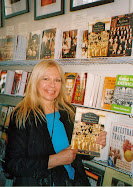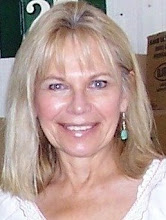Sunday, August 18, 2013
Connecting with Ursula on the ancestral plane
Some ancestors call out to me more than others. Of course, if I could time travel back to their eras, I would want to meet every single one of them. But there are some I would want to spend a particularly long time with.
To me, the "ancestral plane" is something like a very big party. The guests include family members I knew in this lifetime (my Babcia, my Dad, my aunts and uncles), relatives that I never knew but heard about through them (my great-grandfather Antoni Ruscik, my Dad's youngest sister, Annie), and many, many ancestors whom I've become aware of through family research. Helpfully, those people are all wearing "Hello, my name is ..." badges so I can finally put a face to a name as we introduce ourselves.
But there are a few individuals who need no introduction. We make eye contact across that crowded room, and there is an instant sense of recognition, an affinity of souls. We have always known each other, somehow, across time and space. I yearn to talk with them, to learn more about their lives than I can ever glean from genealogical research.
Who, what, when, where, why, and how
In a family like mine, there is precious little information recorded about any one person's life. In Europe, the sources are for the most part limited to brief entries in church registers of baptisms, marriages, and deaths, and in occasional church or civil censuses. In the United States, for our 1890s-1914 immigrants, there is little beyond the standard official records (passenger lists, military registrations, citizenship papers, and such).
From their arrival in this country through the 1920s, at least, there is almost no documentation or description of their lives. Most of our immigrants were young, in their late teens and twenties; most were single. All were looking for work, trying to get a foothold in a country where they could not speak or read the language (at least, not much). What they did, who they did it with, where and when they did it, and why—I wonder about this endlessly.
I have found almost nothing about any of my Polish immigrant ancestors in the English-language newspapers of the cities they lived in. And I have spent many, many hours reading through microfilmed copies of the old dailies published in Worcester, Boston, Pawtucket, Lowell, Springfield, etc.
In search of wedding news
So I didn't have very high hopes for finding anything when a fourth cousin and I recently spent the day in Maynard, Massachusetts, a town where our shared Bogdan-Przyjemski family lived in the early twentieth century. What I really, really wanted was to find some newspaper mention of the September 26, 1915, marriage of Urszula Przyjemski to Jozef Szlachciuk. In July 2012, I wrote about Urszula's marriage in "Discovering Julian Prokopowicz's Bogdan family in America," which features the group portrait made for the wedding.
Had that portrait not been inscribed on the back, had it not come down to me, I most likely never would have known about my grandfather Julian's relatives in Maynard. Urszula's wedding was the key that unlocked a room full of family history. Would newspaper coverage of the event perhaps unlock more? I really hoped so.
The Maynard weeklies
In 1915, two weekly newspapers served Maynard (population then about 6,500) and environs: the Maynard News and the Maynard Enterprise. The Maynard Public Library has both on microfilm; the reference librarian noted that some issues were missing (a situation not uncommon with century-old newspapers).
We started our search that day with the Maynard Enterprise; unfortunately, the issue that would have been published in the week following the wedding was not on the microfilm. We checked the subsequent issue, but weren't surprised to find no mention there.
As we scanned the pages—those good old-fashioned broad pages with nine columns of tiny type—we could not help noticing the almost complete lack of any coverage related to Maynard's Polish population. Even the English-speaking Irish Catholics of St. Bridget's Parish got little attention. Among the town's diverse ethnic groups, only the Finns seemed to merit a few inches of print.
An electric sign, a whist party, a wedding
We moved on to the Maynard News, whose content mirrored that of the Enterprise. The News was published on Fridays, so we zeroed in on the October 1, 1915, edition, printed just five days after Urszula's Sunday wedding. Eight pages, small font, much of the newsprint faded long before it was reproduced on microfilm.
Typical of the era, the News consolidated most of its local coverage under town headings: "Maynard," "Sudbury," "Acton." A sentence reporting someone's weekend trip to Boston might be followed by a death notice, which might in turn be followed by an announcement of a concert or a runaway dog.
By the time we reached page eight, our hopes were dim. But there at the bottom of page eight, in a "Maynard" potpourri that told of a "new electric sign" in town, a meeting of the Knights of Kaleva, a family's houseguests from Vermont, and a whist party at the Masonic Hall, there it was: a two-sentence announcement of Urszula's wedding.
"There was a wedding on Thompson street, Sunday, when Rev. Francis Jablonski joined in wedlock Miss Ursula Pryjenski and Joseph Szlacheink. The usual festivities followed," the newspaper reported.
Some information, some questions
Twenty-five words, no more. Surnames misspelled, no surprise. The announcement didn't say much, yet it spoke volumes.
We might have hoped for some mention of other members of the wedding party, if there were any besides the two witnesses (one being my grandfather, Julian Prokopowicz). Or perhaps a description of the bride's gown (once upon a time, many newspaper inches were lavished upon detailed descriptions of veils and lace and trains and beads and fabrics).
What did it tell us? I was surprised to learn that the wedding took place at the family home rather than at church, which would have been St. Bridget's, since St. Casimir's Polish Catholic church was still a decade away from being built in town. I would guess it was a noon or afternoon wedding, since Rev. Jablonski would have been busy with Mass on that Sunday morning.
What "usual festivities" followed the wedding? I can imagine lots of food, lots of music, lots of guests. For Kazimierz and Elena Bogdan Przyjemski, the marriage of their first-born child, their 17-year-old daughter (18, according to the town record), would certainly have been cause for celebration. And Sunday would have been the one day of the week when friends and family living in Rhode Island and elsewhere in Massachusetts might have been able to travel to Maynard to share in the joyous occasion.
Who did the reporting?
Perhaps most significantly, the write-up told us that, despite the dearth of news space devoted to Maynard's Polish immigrants, this event made it into print. How did that happen? Who took the initiative to report the event? We'll never know.
I'm intrigued by the different possibilities raised by the spelling, wording, and details in the announcement. If the family reported the wedding, surely the bride's and groom's surnames would have been spelled correctly, at least at the outset. It's not inconceivable that the errors might have been made at the newspaper, either in copying the information, or typing it, or typesetting. If a reporter assigned to town hall dutifully recorded all the marriages for the week, it might have become a tidbit in the community news column that way. That's quite possible.
But here's how I imagine it: Ursula took the initiative to go to the newspaper office, perhaps with the marriage certificate in hand as documentation. After all, she had come to this country in early childhood; she would have been educated in Maynard schools, probably equally fluent in English and Polish by the time she was a teen-ager, and comfortable in her community. She may well have been more fluent in English than Joseph, who, though a few years older than her, had immigrated more recently. Or maybe the newlyweds went to the newspaper office together, if they were able to squeeze in time before or after their jobs at the American Woolen Company mill.
Why did it matter?
Why would it have been important to share their news in an English-language publication that perhaps few of Maynard's Polish immigrants might have read? Well, people generally like to share happy news. (Facebook is full of it, announcements and photos and thumbs-up "likes.")
Beyond that, maybe Ursula and Joseph wanted to create a more public record of their marriage than the listing in Maynard's 1915 annual town report would have afforded them.
Or maybe Ursula sensed somehow that she wouldn't have many opportunities ahead to let the world know she was here. In fact, her time was limited. She would live long enough to give birth to her only child in 1916, when her name would appear as "Celia" in the town records. When her husband, by then known as "Joe," registered for the World War I draft in 1917, she would be referred to only as "wife."
When Ursula died suddenly at the height of the influenza epidemic in October 1918, just nine days after her third wedding anniversary and a few months after her 20th birthday, there would be no obituary; newspapers could not keep pace with the volume of deaths that fall. When she was buried in Pawtucket, Rhode Island, her gravestone identified her as "Celia Scluck."
Feeling her presence
What if Joseph and Ursula had not moved to Rhode Island in that final year? What if they had stayed in Maynard? Would she have escaped the flu? Would she and Joseph have had other happy events to announce in the Maynard News in decades to come?
I wonder about that.
I felt Ursula's presence so strongly during that day in Maynard. Not only did my cousin and I find the wedding announcement, we found the house on Thompson Street where Joseph and Ursula were married in 1915. Sitting in the car, parked in the pouring rain, we spent some time talking about the Przyjemski family's years there, wondering about their lives, imagining "the usual festivities" that must have filled the house and yard on that September afternoon so long ago.
We have a lot to talk about with Ursula on the ancestral plane.
Subscribe to:
Post Comments (Atom)










No comments:
Post a Comment